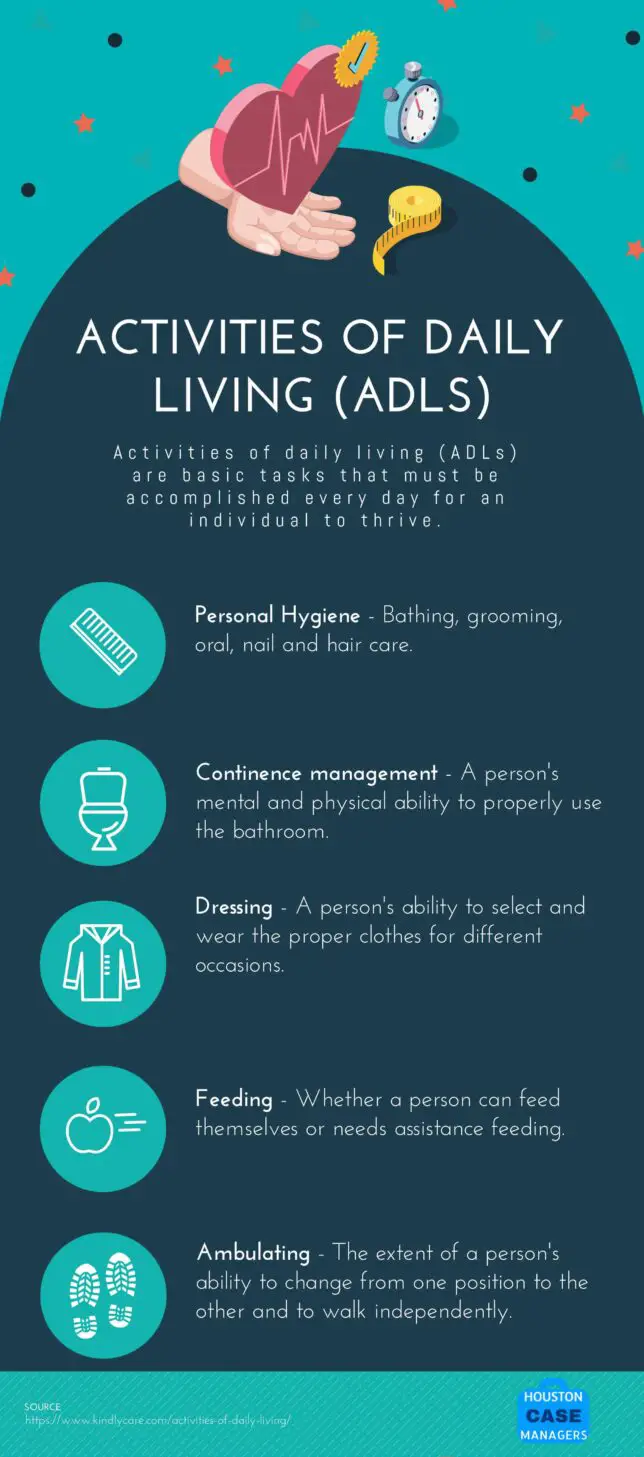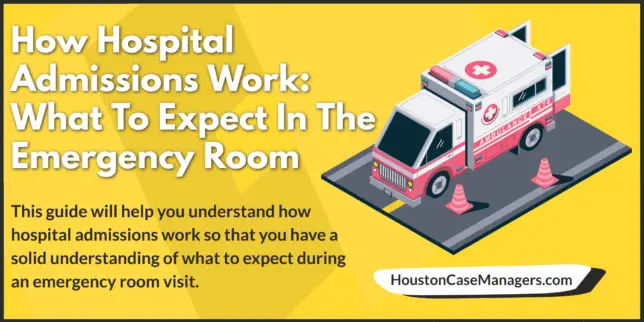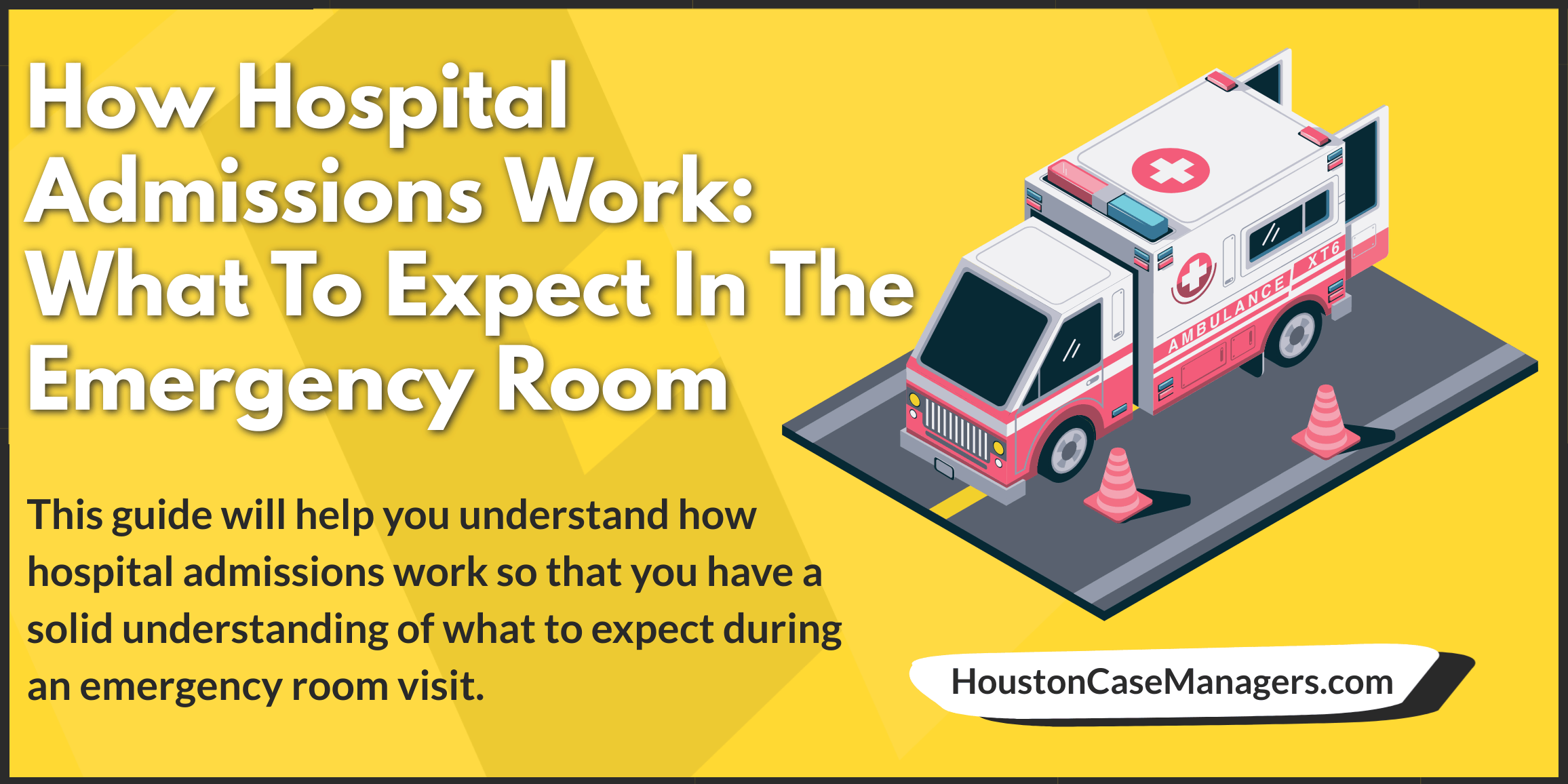How Hospital Admissions Work
In this guide, I will explain everything you need to know about how hospital admissions work.
At some point in your life, you or a family member will likely need hospital admission. While this can be a scary thought, familiarizing yourself with the hospital admission can help to put you at ease and give you the best chance of a full recovery upon hospital discharge.
I’m Nick Bryant, founder of HoustonCaseManaagers.com, where we help medical professionals and citizens to better understand healthcare topics like hospital admissions.
Today I’m going to provide you with information that will help you to understand how hospital admission work. This guide will cover ER admission topics like:
- What is a hospital admission?
- Reasons you should go to the hospital
- The items to bring with you
-
How to get to the hospital
-
Types of hospital admissions
-
Types of hospital units
-
Your rights while admitted to the hospital
-
Hospital services during your hospital admission
-
Common tests performed during a hospital stay
As you can see there is a lot to discuss so let’s get started!
What Is A Hospital Admission?
This is a situation where you are admitted into a hospital to receive treatment for a medical condition or injury. A hospital will keep you for admission if you are too sick or injured to stay at home.
Reasons To Visit The Hospital
Sometimes patients hesitate to seek emergency treatment due to thoughts that their condition may not be serious. Guessing wrong could lead to death.
To better understand, you should visit an emergency room if your current medical condition could result in the loss of life or limb if you are not treated soon. Here are a few reasons where you would want to contact 911 for help.
- Problems breathing
- Shortness of breath
- Sudden or severe pain
- Mental health emergencies like suicidal or homicidal thoughts
- Coughing or vomiting blood
- Severe blood loss
- Extreme stress or stomach pains
- Broken bones
Items To Bring To The Hospital
Here is a quick checklist of items to pack for your hospital admission:
- Your cell phone, a charger, earbuds
- Current medications
- Your reading glasses or contacts
- Toothbrush, toothpaste, shampoo, soap
- A robe and slippers
- Extra socks and underwear
- A hairbrush or comb
- Clothes to wear when you are discharged
- Snacks
Getting To The Hospital
There are multiples way of going to the hospital, all dependent on the state you are in and probably those around you:
Driving Yourself To the Hospital
You may help at a hospital’s emergency department if you feel very ill; however, if the illness should be treated as an emergency condition if you need fast and effective care. Generally, any condition that is a life, limb, or body functional-threatening problem such as stroke, trauma, or similar problems.
Someone Else Driving You To The Hospital
While you can take yourself to the hospital, in most cases, especially in emergencies, someone else should take you or the patient there to avoid additional problems or injury. In such cases, you should ask family or friends to take you if you are ill.
Calling An Ambulance
Alternatively, you may call 911 for emergency services or ask someone to call 911 for an ambulance. This option is usually necessary after considering the seriousness of the problem, the symptoms, and the possibility that your condition may worsen. This is to say that the patient may be attended to in the ambulance on the way to the hospital. Such conditions that may necessitate an ambulance include:
-
-
Shortness of breath
-
Heavy bleeding
-
Major trauma
-
Moderate to severe headache
-
Chest pain
-
Confusion or loss of consciousness.
-
High fever
-
Types Of Hospital Admissions
Several types of hospital admissions exist, with elective and emergency admissions being the two major types. Here, we will examine the two major types of hospital admissions briefly alongside the other hospital admissions types.
Emergency Admission
This type of admission occurs through the ER. In this type of admission, you may be admitted to a floor, a specialized unit such as the medical or surgical intensive care unit, or an observation unit.
Elective Admission
In this type of admission, there is a known medical condition that may require further treatment. In an elective admission:
- You may delay the admission until there is a more convenient time for you and your PCP.
- An elective admission may be required to visit the hospital several days in advance for medical tests like X-rays, lab work, or some other prescreens.
- You will need to come to the hospital’s admitting office.
Observation Admission
This type of admission, also known as holding unit admission, often occurs through the emergency department.
An observation admission involves you visiting a hospital for diagnostic testing. Unless your test shows a positive result, you will likely be discharged within 1-2 days.
Direct Admission
This type of hospital admission occurs when your direct doctor sees the need for hospitalization.
In such a case, your doctor may coordinate an ambulance ride to the hospital or may drive yourself if it is safe to do so. During direct admissions, your doctor may reserve a bed at a specific hospital, so it’s important to know the exact hospital that you are being admitted to.
Transfer
As the name suggests, you may be moved to another hospital for multiple reasons such as:
- Your doctor does not practice at the first hospital that you admitted to.
- You need specialized care not offered by the hospital where you are currently.
- Your insurance does not cover further care at the initial hospital you were admitted to.
While you can request a transfer at any time, you should be aware that it will take some time to find an accepting doctor and a hospital bed. Transfers typically require an ambulance to transport you. Sometimes, your doctor may require you to visit the ER for several reasons, which may not necessarily require admission.
You may be sent for an evaluation and treatment in the emergency department by your doctor if this cannot happen in their office. If they require you to be admitted, however, many will complete a direct admission.
Types Of Hospital Units
Depending on the level of care that your condition calls for, you will be admitted to a certain level of care in the hospital. In the same light, you can be upgraded or downgraded from a floor at any time, depending on your condition.
-
Intensive care unit– The ICU is typically reserved for the sickest patients who require close monitoring, nursing supervision, or a ventilator.
-
Pediatric intensive care unit– reserved for children
-
Cardiac care unit- Similar to the ICU but reserved especially for people with heart problems
-
NICU – The NICU or neonatal intensive care unit treats newborn babies.
-
Neurological- Reserved for people who have suffered a stroke.
-
Oncology- People with cancer
-
Surgery Floor- This is the floor where patients needing surgery go.
-
Medical Floor- A general for medical care
-
Emergency department- If you are admitted to a hospital floor, but there is no bed available then you may have to wait in the ER room. ER nurses would continue to provide you with care until you are admitted to the floor.
Your Patient Rights At The Hospital
Knowing your rights as a patient at a health facility is vital in ensuring you get adequate and proper medical care. These rights include the following:
-
Your rights as listed in the hospital’s Patient’s Bill of Rights-If these rights are not given to you, ask for them.
-
Whenever you go to a hospital, you must be given a medical screening exam and be evaluated for care. The severity of your medical problem will determine the level of treatment after this exam.
-
Any patient has the right to considerate and respectful care.
-
Every patient has the right to complete information regarding your diagnosis, treatment, and expected recovery in terms that you can understand.
-
You are entitled to know the doctor’s name and all the health care personnel providing you with care.
-
Every patient should receive sufficient information about the benefits, risks and other alternative treatments or procedures to give informed consent for any procedure performed on you.
-
As a patient, you have a right to privacy. HIPPA Law prevents your doctor from talking to anyone about your medical care without your consent.
-
In case you require a transfer to another facility, the information on why you need the transfer must be provided to you. Additionally, the hospital you are being transferred to must accept you before transfer.
-
You are entitled to know if any operation will be performed on you if it will affect your care and that you can refuse participation at any time, for any reason.
-
Right to reasonable continuing care once discharged.
-
The right to access information about your continuing medical needs after you are discharged.
-
Any patient has the right to know the hospital rules and regulations applying to your conduct.
Hospital Staff Members
Here is a list of hospital staff members that you will likely encounter during your stay.
Hospital Doctor
Your doctor is responsible for looking over your discharge plan and signing off on it.
Their responsibility is to anticipate any risks, ensure that the right medications have been prescribed, and see to it that all your medical needs are met prior to you being discharged.
Nurses
The hospital nurse is probably the staff member that knows you best in the hospital.
They have likely been with you throughout your admission and now during your discharge. If you have medical questions during your discharge the nurse that you have been working with can probably answer these.
In some hospitals, the nurse also acts as your case manager.
Case Managers
Your hospital case manager helps you to coordinate with doctors, therapists, and other staff members.
Case management staff will develop your care plan, assist you with navigating inpatient settings, and help you understand your discharge plan.
Social Worker
Social workers can help you connect to community resources and explore the medical or government benefits that you may qualify for.
Discharge Planners
A discharge planner is a staff member who helps you to connect to the medical resources and schedule follow-up appointments that you will need to recover outside of the hospital.
Discharge planners may be licensed as either a nurse or even a social worker.
If you have questions about services covered by your insurance or the types of medical equipment you can receive, your discharge planner will be able to help you.
Occupational Therapist
An occupational therapist can help you to recover and maintain the skills that are needed for activities of daily living.
Occupational therapists typically work with seniors who are recovering from physical or cognitive issues. They also help individuals of all ages who have disabilities to resume common activities of daily living.

Physical Therapist
A physical therapist’s primary function is to work with you to help you regaining mobility and reduce pain. They can do this in either a clinical rehab setting or inside your home.
Speech Therapist
Speech therapists work with individuals who have suffered from a stroke or some type of neurological condition that has resulted in communication problems.
Home Caregivers
Not to be confused with home health nurses, a caregiver will help you with daily living activities.
This can include things like bathing, grooming, and meal preparation.
Something to note is that Medicare does not cover this service. To receive help paying for a home caregiver you will have to have Medicaid, payout of pocket, or receive VA benefits.
Home Health Nurse
When you qualify for home health you are essentially receiving nurse visits. These workers do not typically help with grooming, however, they can help with things like:
- Measuring vital signs
- Administer medications
- Re-dress wounds
- Help you to create a treatment plan
Unlike home caregivers, home health is covered by Medicare.
Services Offered During A Hospital Admission
Plenty of services are offered in hospitals, but some of these may be limited by your doctor or your medical condition. Here are some of the services offered at hospitals:
Meals
Most hospitals will give you choices and menus for meals. However, it is key to note that you may be restricted on some diets if you have certain kidney failure and diabetes conditions.
You may also be restricted from eating at all at any time, including before a test, surgery, or treatment. If your family, friends, or relatives want to bring you food from the outside, it is important to check with your doctor or nurse for permission.
Hospital Visiting Hours
Every hospital has its visiting hours posted. Make sure to check whether there may be restrictions on children or any other restrictions set to protect the visitors or patients, such as the use of gowns or face masks.
Family Boarding
Some hospitals may permit family members to stay overnight in a person’s room. Usually, this is allowed for parents of admitted children. Ensure to check with your hospital if this is allowed if you intend to do so.
Medications
While the nurse is in charge of administering your prescriptions, your doctor writes the orders for them.
TV, Phone, Internet
While some hospitals may provide free TV services, most of them will charge you for this additional facility. Ensure you know this extra cost if you are being charged because your insurance does not cover it.
Whether you will be charged for local calls will depend on the hospital you are admitted to. Long-distance charges, on the other hand, will be added to your billing.
As for the internet, the hospitals that provide free wireless internet services will require you to obtain a wifi password that can be obtained from the nurses.
Hospital Billing
Before leaving the hospital, you want to check with the hospital administration department regarding your bill. You may be offered payment plans and even allowed to negotiate the final amount owed depending on the hospital you are at. Negotiating your bill is especially ideal if you are a self-pay patient.
Common Tests Performed During A Hospital Stay
During your hospital admission, some common tests could be performed on you, such as:
-
Blood work: Usually, a blood sample is taken from a vein in your wrist or thigh.
-
X-rays: Portrays a two-dimensional picture of a body part. Although it provides limited detail, it is especially good for fractures, certain abdominal processes, and lung infections.
-
Intravenous: Involves placing a catheter in a vein, usually in your arm, to begin a fluid replacement or administer drugs or blood products.
-
MRI: A procedure that produces a detailed internal image of a body part.
-
CT scan: Ct scan takes 36-degree continuous images of a body segment like your head or chest. It provides greater detail than regular X-rays.
-
Ultrasound: This procedure bounces sound waves off internal body parts for a dynamic representation of the particular structure.
-
Catheterization: Involves the insertion of a tube or catheter into a vein or artery to obtain a biopsy, inject contrast material into a blood vessel for imaging purposes, or perform a cardiac catheterization procedure to repair blocked arteries.
-
Biopsy: This procedure is a means to take a sample of an organ to determine the disease status or diagnosis.
Conclusion
Every hospital admission is different, so there is no way to predict exactly what will happen during your hospital visit. That being said the information found in this guide provides you with a basic understanding of how inpatient admissions work and what you can expect if you do need treatment at a hospital.
Now that you have a general understanding of what happens during a hospital admission, you may be interested to know how hospital discharges work. If so, we created an easy-to-understand guide titled This Hospital Discharge Guide Will Make You A Smarter Patient.
Similar Articles That May Interest You:
- Where To Find Free Medical Equipment In Houston
- Patient Assistance Programs: How To Save Money On Prescription Medications
- Medicaid Retroactive Coverage: Assistance Paying For Hospital Bills Dating Back 3 Months
- Ultimate Guide To Cheap Medical Transportation In Houston
- Ultimate Guide To Finding Speech and Physical Therapy In Houston
Nick Bryant is the author of Understanding Healthcare Is Half The Battle and a Senior Counselor with 13+ years of experience working in community health and mental health. He enjoys spending time with his family, watching WWE on Friday nights, and working toward a Google Data Analytics certification. If you have additional questions about community resources or government assistance programs, simply leave a comment below and he will follow up as soon as possible.



